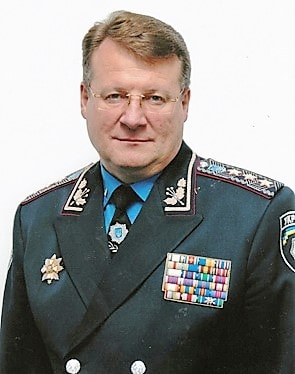CONTINUATION. BEGINNING: Vladimir Bedrikovsky: the taking hand of Prosecutor General Lutsenko. PART 1
Bedrikovsky Vladimir: the taking hand of Prosecutor General Lutsenko. PART 2
“Crime Fighters”
Ukrainians joke that the traditional concepts of “right hand” and “left hand” in relation to Yuriy Lutsenko have a slightly different meaning: his left hand holds a glass, and his right hand pours. In this regard, Vladimir Bedrikovsky, who has become so close to Lutsenko that he is now called his “consigliere” and “treasurer,” is undoubtedly his right, “pouring” hand. And their close friendship began immediately after the first Maidan.
Sources Skelet.Info They report that the Main Directorate for Combating Organized Crime of the Ministry of Internal Affairs played an important role in the success of Maidan 2004. Since among its organizers were criminal “authorities” with their “brigades” and “titushkas” – for example, Vladimir Didukh, the Organized Crime Control Department was the first who could stop them. To do this, you wouldn’t even have to disperse or detain anyone, just show the “authorities” their dossier and recommend them to sit quietly. But neither the Main Directorate for Combating Organized Crime, nor the capital’s Organized Crime Control Department, nor the departments in other cities interfered with the “Orange Revolution”. Perhaps this is the answer to the question why, after the first Maidan, of all the “cops”, it was the Kyiv “ubopovtsy” who rose so highly.
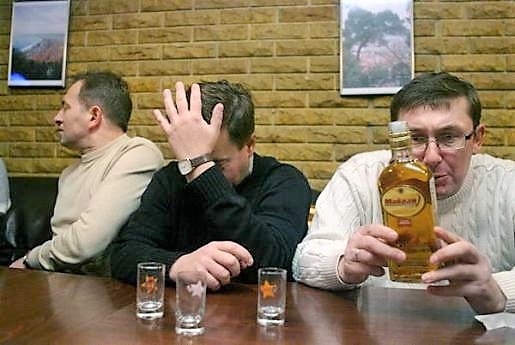
Nikolay Tomenko, Vladimir Bedrikovsky, Yuriy Lutsenko – alcoholic brothers
In February 2006, Bedrikovsky temporarily left the capital’s ministry, receiving an appointment to the Zhytomyr region: first as acting, then as head of the regional Ministry of Internal Affairs. Without particularly distinguishing himself in this post, Bedrikovsky returned to Kyiv in January 2008, having been appointed Deputy Minister of Internal Affairs (Yury Lutsenko) and head of the Main Directorate for Organized Crime Control of the Ministry of Internal Affairs. From that moment on, a special trusting relationship began to work between Lutsenko and Bedrikovsky, which allowed the latter to launch large-scale corruption activities.
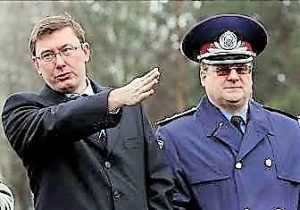
Yuriy Lutsenko and Vladimir Bedrikovsky
First of all, Bedrikovsky restored the coordination of corruption schemes of the regional Organized Crime Control Department, on which he sat back in 2003-2005. They were different, but the media then noted the most odious scheme of the Odessa Organized Crime Control Department (headed by Vasily Samokish), who was engaged not only in “protection” for smuggling, but also in banal “scammers” and robbery. They robbed Chinese businessmen who transported goods in containers through Odessa. First, they sent a person to them with an offer to help with customs clearance, accepted the containers, after which the Organized Crime Control Department detained the Chinese as suspects and, with the help of the border service, deported them from Ukraine with a subsequent ban on entry (familiar scheme, right?). The contents of the containers were then sold and the money divided. Of course, not everyone was robbed (otherwise all the Chinese would have simply avoided Odessa); they mostly “earned money” by taking $200 per container for the fact that it would not be suddenly searched and arrested by the “ubopovtsy.” When the scheme became public and employees of the Organized Crime Control Department began to be called in for interrogation, Samokish boasted that he was working for Bedrikovsky and that they would shut him down. And they really covered it up: despite the scandal, Samokish was then transferred to head the Organized Crime Control Department to the Department of the Ministry of Internal Affairs of the Sumy region, where he made a good career for himself, in 2015 heading the regional department of the National Police.
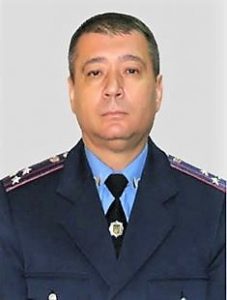
Vasily Samokish
But then, in 2009, Samokish and his patron Bedrikovsky were also involved in another scandal, which was also quickly hushed up from Kyiv. This was the illegal detention (actually kidnapping) by employees of the Odessa Organized Crime Control Department of the head of the public organization “Druga znachennya” Dmitry Mironenko and the former director of LLC “Consent” Igor Mityai – with the subsequent exertion of physical and psychological pressure on them, which they later talked about reported in the statement of “Other Recognition”which demanded an investigation into the involvement of Vladimir Bedrikovsky and the prosecutor of the Odessa region Vasily Prisyazhnyuk. The essence of the conflict was a dispute over the Odessa market “New City”, which was previously seized by raiders from LLC “Consent”.
All these scandals served as a justifiable reason for the dismissal of Vladimir Bedrikovsky immediately after the resignation of his boss Yuriy Lutsenko. But if Lutsenko was later even imprisoned, Bedrikovsky was removed from the Ministry of Internal Affairs under a peace agreement, under the pretext of his retirement due to his years of service (at 46 years old). Obviously, this could not have happened without some of his defenders who were capable of reaching an agreement with the new government. And in the next few years, the former main “ubopovets” was almost out of work: he worked part-time as a lecturer at the Kiev International University, and unsuccessfully ran in the 2012 elections in a majoritarian district in the Zhytomyr region.
Bedrikovsky returned to the civil service only in 2016, when Yuriy Lutsenko became the Prosecutor General of Ukraine and invited his former “consigliere” to the post of head of the Department of Supervision of the Prosecutor General’s Office. And this eloquently suggests that from that moment Bedrikovsky became one hundred percent Lutsenko’s man, and only his personal one. And no matter how anyone treats the hapless “alcoholic Yuga,” he is diligently forming a team of his own people in the Prosecutor General’s Office, which over time will allow him to turn the GPU into his fiefdom. And this team very soon showed that it is not afraid of anyone, even NABU, “protected” by the Americans. As the media reported, it was Bedrikovsky who was behind the searches at NABU organized by the Prosecutor General’s Office in August 2016.
Having parroted NABU, in the fall of 2016 Vladimir Bedrikovsky began a corruption routine. First, he helped out his own subordinates – supervisory prosecutors Dmitry Petrov and Sergei Yakovenko, who got into a scandal around the Grosser company, for which a conflict broke out between its founders. One of the parties to the conflict arranged the seizure of all property, the other side turned to law enforcement agencies, then the first side called for the help of supervisory prosecutors in order to “resolve the issue.” And Petrov and Yakovenko already managed to become famous for their income declarations, in which the first “earned” more than 2 million by selling unknown property, and the second “won in the litorea” more than a million. By the way, have you noticed that with the arrival of Yuriy Lutsenko at the GPU, prosecutors began to have incredible luck in the lottery?! And yet, the “Grosser” case assumed the proportions of a public scandal, prosecutors Petrov and Yakovenko were removed from official duties, and the materials on them were transferred to NABU. Then Bedrikovsky, saving his subordinates, requested all the materials on the case to the Prosecutor General’s Office, after which he hid them under the carpet.
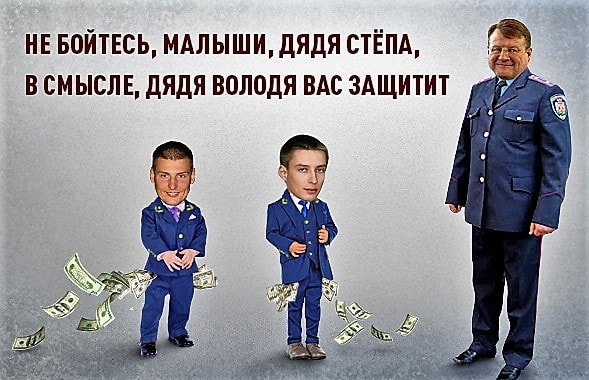
Caricature of Bedrikovsky, Petrov and Yakovenko
In November 2016, Bedrikovsky’s name was heard in the context of a new corruption scandal: fraud at customs carried out by Torgest LLC. The point was that by clearing containers of Chinese fabrics at the Stolichny customs post (Kyiv), the company artificially lowered the estimates of customs duties, causing damage to the state – about which Sumy activist and ATO veteran Alexander Semesenko officially spoke informed the State Fiscal Service authorities of the Sumy region. The cargo (200 tons of fabric) was arrested and sent to Sumy, and then the supervisory prosecutor’s office of Bedrikovsky intervened in the case. As the media reported, the owners of the seized cargo received an offer from Vladimir Vladimirovich “for only 500 thousand dollars” to get their fabrics back, in addition, the prosecutor’s office offered to continue to help with customs clearance of cargo. It was reported that at the same time Bedrikovsky deliberately snatched “bread” from the then head of the State Fiscal Service Roman Nasirov, not at all afraid of a war between departments. And as he looked into the water: soon Nasirov was arrested, and numerous sources Skelet.Info reported that the Prosecutor General’s Office entered the fight for Ukrainian customs.
With such a scale of corruption activities, the size of Vladimir Bedrikovsky’s property declared and additionally discovered by journalists looks too small. If, of course, this can be called two apartments in Kyiv (67 and 143 sq.m.), registered in the name of his wife and son, several plots of land, expensive foreign cars, as well as a house with an area of 583 sq.m., located near Kiev and registered on Bedrikovsky’s mother and not indicated in his declaration. It was over this house that the quadcopter of social control activists was shot down, and it is absolutely clear that this was not done by the 80-year-old mother of the prosecutor. But, according to sources, in addition to income from his current prosecutorial activities, Bedrikovsky has shares in commercial structures, including from the days of his “Ubop youth.” So the true size of his capital is still known only to him and his family.
Sergey Varis, for Skelet.Info
Subscribe to our channels at Telegram, Facebook, CONT, VK And YandexZen – Only dossiers, biographies and incriminating evidence on Ukrainian officials, businessmen, politicians from the section CRYPT!

